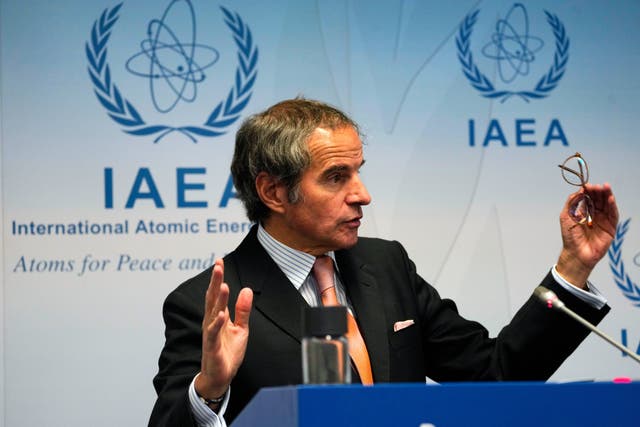Israeli strike on Iran ‘would be inappropriate’ during nuclear talks – Trump
The US president added that an agreement could come together ‘over the next couple of weeks, if it happens’.

Donald Trump said he has told Israeli Prime Minister Benjamin Netanyahu to hold off on striking Iran to give the US administration more time to push for a new nuclear deal with Tehran.
“I told him this would be inappropriate to do right now because we’re very close to a solution,” Mr Trump told reporters at the White House.
“Now, that could change at any moment. It could change with a phone call. But right now, I think they want to make a deal. And, if we can make a deal, (it would) save a lot of lives.”
The US president added that an agreement could come together “over the next couple of weeks, if it happens”.
His comments came as the head of the United Nations’ atomic watchdog said “the jury is still out” on negotiations between Iran and the US over Tehran’s nuclear programme – but described the continuing negotiations as a good sign.

Rafael Mariano Grossi, director-general of the International Atomic Energy Agency (IAEA), described himself as being in near-daily conversation with Iranian foreign minister Abbas Araghchi, as well as talking to Steve Witkoff, the US Middle East envoy.
Mr Grossi acknowledged one of his deputies was in Tehran on Wednesday. Iranian officials identified the official as Massimo Aparo, the head of the IAEA’s safeguards arm.
That is the division that sends inspectors into Iran to monitor its programme, which now enriches uranium up to 60% purity – a short, technical step from weapons-grade levels of 90%.
“For the moment, the jury is still out. We don’t know whether there’s going to be an agreement or not,” Mr Grossi told journalists attending a week-long seminar at the agency in Vienna.
However, he described the ongoing meetings as a good sign.
“I think that is an indication of a willingness to come to an agreement. And I think that, in and by itself, is something possible.”
Iran and the US so far have held five rounds of talks in both Muscat, Oman, and Rome, mediated by Omani Foreign Minister Badr al-Busaidi. A sixth round has yet to be set.
The talks seek to limit Iran’s nuclear programme in exchange for the lifting of some of the crushing economic sanctions the US has imposed on the Islamic Republic, closing in on a half-century of enmity.
Mr Trump has repeatedly threatened to unleash air strikes targeting Iran’s programme, if a deal is not reached. Iranian officials increasingly warn they could pursue a nuclear weapon with their stockpile of uranium.
Mr Trump has described Iran as having an American proposal to reach a deal. However, Iran has repeatedly denied receiving such a proposal, with a fresh denial on Wednesday by Mohammad Eslami, the head of the Atomic Energy Organisation of Iran.
However, if a deal is reached, Iran might allow the IAEA to have American inspectors on their teams during inspections, Mr Eslami said. Americans represent the largest single nationality of IAEA employees, a 2023 agency report showed.
Before Mr Grossi’s comments to journalists in Vienna, the head of Iran’s paramilitary Revolutionary Guard issued a new warning to the US as the negotiations go on.
“Our fingers on the trigger, we are in ambush and we are waiting,” General Hossein Salami warned. “If they make a mistake, they will immediately receive responses that will make them completely forget their past.”
Despite the tensions, Mr Grossi said that he believed “there’s always a way” to reach a deal between the Americans and the Iranians – even with the disagreement over enrichment. He added the IAEA had been making some “suggestions” to both the Iranians and the Americans, without elaborating.
However, he added that any possible deal likely would require a “solid, very robust” IAEA investigation of Iran’s programme to understand where it stood after years of Tehran restricting inspectors’ ability to assess it.





